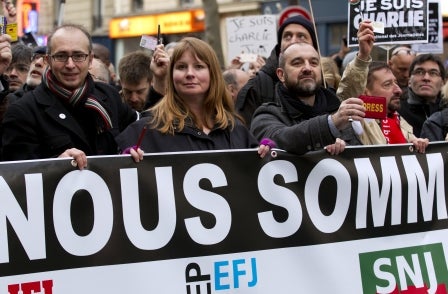
The brutal excecution of the Charlie Hebdo journalists last week didn't surprise me. There have always been those who are so arrogant, and yet so thin-skinned and insecure about their beliefs, that they feel compelled to kill people who disagree with them.
Dr Goebells. Lenin. Cherif and Said Kouachi. They're all the same. Disagree, and you die.
These are extreme examples. But I've dealt with people with similar attitudes for the whole of my journalism career. People who say they believe in free speech … until you say something they don't like.
People like the Met Police, who withdrew all press facilities and advertising from my newspapers when we criticised them.
People like the IRA, who made death threats against me after I criticised them for blowing up an Army careers office in Wembley.
People like the north London underworld gangsters, who said they'd seriously harm me if I didn't retract allegations of murder.
And any number of politicians, business people, sports stars, vicars, union officials, imans etc, who would go to astonishing lengths to stop me writing things they didn't like. And who would make you pay if you published.
Journalists, cartoonists and photographers are always top of the hit list when freedom is under threat. Any UK press photographer will tell you that.
Pressure like this resulted in some UK news organisations failing to publish the 'offensive' cartoons that caused last week's bloodbath in Paris – even though they were central to the story.
They are gutless. They want free speech, provided it doesn't cost them anything. The quiet, brave Charlie Hebdo journalists show them up for what they really are.
Since last week's shootings, people have asked me what I teach journalism trainees about free speech. It's easy. And I make no apology for it:
-
Real news is something that someone wants to suppress. So reporting it comes at a price. That price may ultimately be death. Journalism is not a career for wimps.
-
Journalists should publish what they believe to be true, whatever the consequences. They should 'Published and be damned'.
-
Journalists should be prepared to fight any constraint on their right to report – including, sometimes, legal and 'ethical' constraints.
- Journalists are not responsible for other people's reactions to their stories. If some readers 'take offence', that's their right … and it's up to them what they do about it.
The 'I'm offended' industry love to quote the law. But they don't often mention that English and EU laws of comment allow journalists – and everyone else – to publish views that 'shock, offend and disturb'.
One learned Judge said that we are free to express our views, even if we are motivated by … 'spite, animosity, intent to injure, intent to arouse controversy.'
This is why the European Union criticised Poland’s supreme court for prosecuting heavy metal band singer Adam Darski. Why?
He ripped pages from a Bible, and referred to the Catholic Church as a ‘murderous cult' during a concert in 2007. An incident for Muslims to ponder.? No religion is beyond scrutiny or mockery, and they all deserve it.
?I sometimes speak to lecturers at UK colleges and universities who would love to teach journalism the way I do … but they're scared. That's the truth.
But I prefer to teach the principle: 'I do not agree with what you have to say, but I'll defend to the death your right to say it.'
Rather than: 'I'll cause your death … .'
Note: Press Gazette has not published this week's Charlie Hebdo front page, but Cleland Thom has done so on his own website.
Email pged@pressgazette.co.uk to point out mistakes, provide story tips or send in a letter for publication on our "Letters Page" blog
